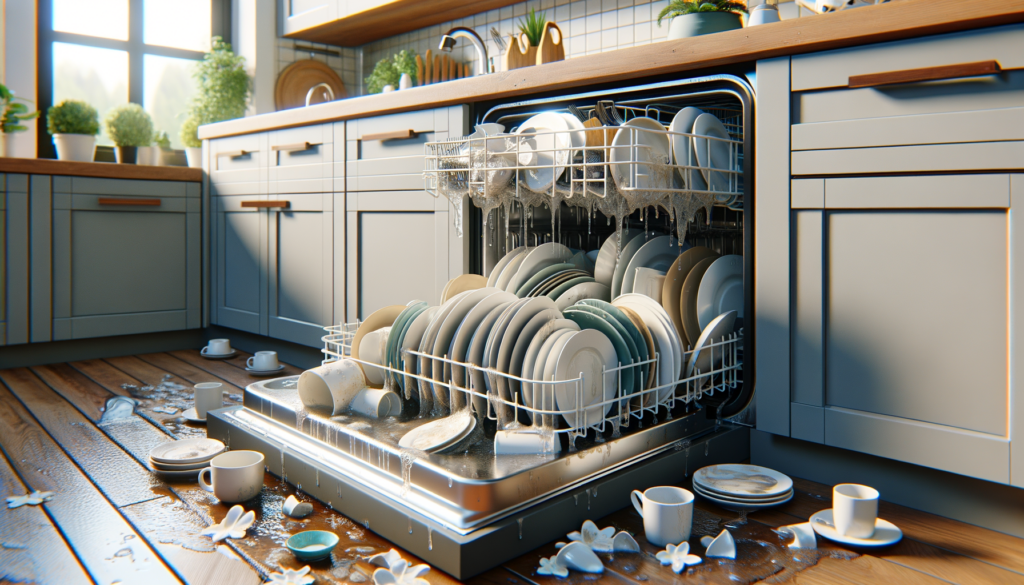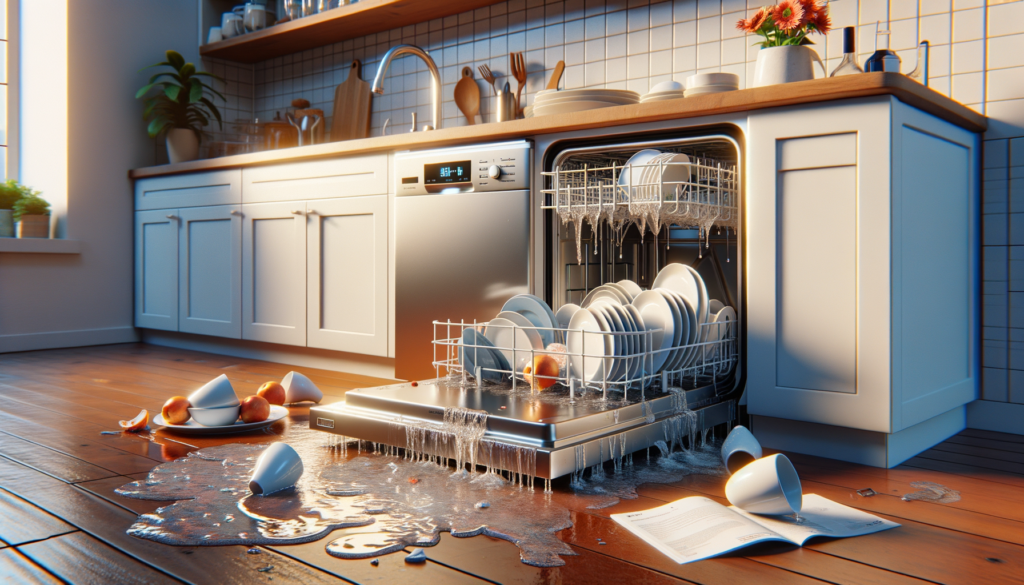
Troubleshooting Common Dishwasher Problems (San Diego Guide): Easy DIY Fixes
Safety first: Turn off the dishwasher, unplug it or switch off the breaker, and close the water supply valve before working on hoses, wiring, or the pump. Keep towels or a shallow pan handy for any residual water.
Table of Contents
- Key Takeaways
- Dishwasher Not Filling with Water
- Dishwasher Not Cleaning Dishes Thoroughly
- Dishwasher Leaking Water
- Dishwasher Making Unusual Noise
- Dishwasher Not Turning On
- Dishwasher Not Dispensing Detergent
- Dishwasher Not Draining Completely
- Dishwasher Door Not Latching Properly
- Dishwasher Leaving Residue on Dishes
- Dishwasher Not Completing Cycle
- FAQs
- What are some common dishwasher problems?
- Why is my dishwasher not cleaning dishes properly?
- How can I fix a dishwasher that won’t drain?
- What causes a dishwasher to leak water?
- Why is my dishwasher making loud or unusual noises?
- What should I do if my dishwasher won’t start?
A dishwasher that fails to drain properly leaves standing water at the bottom of the appliance after each cycle. This can create odors and allow mold to grow. Start by cleaning the filter to restore normal drainage. Rinse it under running water and clear any debris. Next, check the drain hose for kinks or clogs and flush it as needed. If the problem persists, the issue may involve the drain pump or household plumbing. In California, most homes require a sink-mounted air gap; see the drainage and leak sections below for specific steps.
Key Takeaways
- 60‑second Quick Fix Checklist: 1) Clean the dishwasher filter. 2) Run the garbage disposal to clear the inlet. 3) In California, twist off and clear the air gap cap; verify hose routing dishwasher → air gap → disposal/sink. 4) If a new disposal was installed, ensure the dishwasher inlet knockout plug was removed. 5) Confirm the water supply valve is fully open. 6) Reset tripped breaker and check for child/control lock.
- Use a clear symptom → causes → fixes approach for faster troubleshooting.
- San Diego’s very hard water can leave spots; use rinse aid and consider descaling or models with integrated softeners.
- Most manufacturers recommend hot water at about 120°F (49°C) for best cleaning and drying.
- Perform simple maintenance monthly: clean filters and run a dishwasher cleaner cycle.
Dishwasher Not Filling with Water
When a dishwasher won’t fill, start with quick checks:
- Quick checks (1–3 min): Make sure the under-sink water valve is fully open. Verify the door closes firmly and no child/control lock is active.
- Likely causes: Partially closed water valve, stuck float, faulty water inlet valve, or control issue.
- DIY steps: Move the float up and down to confirm it’s not stuck; remove debris around it. Inspect the inlet screen at the water valve for sediment buildup. If the valve hums but no water flows, replacement may be needed.
- When to call a pro: Power is present, valve is open, float moves freely, but unit still won’t fill or shows repeated fill error codes.
Dishwasher Not Cleaning Dishes Thoroughly
If dishes come out dirty or gritty:
- Quick checks: Load so spray arms can spin; avoid blocking detergent cup. Use the correct amount of a high‑quality detergent plus rinse aid.
- Likely causes: Clogged spray arms, dirty filter, low incoming water temperature, very hard water.
- DIY steps: Remove spray arms and clear each jet hole. Clean filters thoroughly. Before starting a cycle, run hot water at the sink until it’s hot, then start the dishwasher to ensure ~120°F (49°C) inlet. In San Diego’s hard water, use rinse aid and consider periodic descaling; models with integrated softeners may require dishwasher salt.
- When to call a pro: Motors don’t spray even with clean arms/filters, or error codes indicate circulation pump issues.
Dishwasher Leaking Water
Address leaks promptly to prevent damage:
- Quick checks: Wipe the door gasket and check for tears or debris. Confirm racks aren’t preventing the door from closing.
- Likely causes: Damaged door gasket, loose/cross‑threaded hose connections, cracked tub or pump seal, or a clogged air gap (California).
- DIY steps: Inspect and replace the door gasket if worn. Tighten hose clamps. In California, remove the air gap cap, clear debris, and verify proper hose routing dishwasher → air gap → disposal/sink. A high loop alone is not code‑compliant in California.
- When to call a pro: Persistent leaks after gasket and hose checks, water under the unit, or suspected pump/tub seal failure.
Dishwasher Making Unusual Noise
| Problem | Common Cause | Symptoms | Repair Steps | Estimated Time to Fix | Difficulty Level |
|---|---|---|---|---|---|
| Dishwasher Not Draining | Clogged filter, air gap blocked (CA), disposal knockout not removed | Standing water after cycle | Clean filter; clear air gap; check disposal inlet/knockout; inspect hose and pump | 30–45 minutes | Medium |
| Dishes Not Getting Clean | Clogged spray arms, low temp, hard water | Residue/film on dishes | Clean arms/filters; ensure ~120°F inlet; use rinse aid/descaler | 20–30 minutes | Easy |
| Dishwasher Not Filling | Closed valve, stuck float, faulty inlet valve | No water at start of cycle | Open valve; free float; replace inlet valve if needed | 30–60 minutes | Medium |
| Dishwasher Leaking | Damaged gasket, loose hoses, blocked air gap (CA) | Water pooling near base | Replace gasket; tighten/replace hoses; clear air gap | 30–45 minutes | Medium |
| Dishwasher Won’t Start | No power, tripped breaker, faulty door latch | No response or error beeps | Restore power; reset breaker; inspect/replace latch | 20–40 minutes | Medium |
Unusual noises often come from debris in the spray arms or filter. Remove any utensils or debris and test again. Grinding or rattling can indicate a circulation or drain pump issue. Additionally, worn bearings or seals can cause persistent noise. If noises continue after clearing debris, schedule a diagnostic to avoid further damage.
Dishwasher Not Turning On

If the dishwasher won’t power on:
- Quick checks: Confirm the plug is secure, the breaker isn’t tripped, and the outlet works. Verify the door latch is engaging and no lock is active.
- Likely causes: Tripped breaker, faulty outlet, failed door latch switch, control panel/timer fault.
- DIY steps: Reset the breaker. Test a small appliance in the same outlet. Inspect the latch for wear or misalignment and replace if needed. Note any error indicators on the display.
- When to call a pro: Repeated breaker trips, no power despite a good outlet, or suspected control board failure.
Dishwasher Not Dispensing Detergent
Poor detergent release leads to weak cleaning:
- Quick checks: Clean caked detergent from the dispenser and ensure nothing blocks the dispenser door.
- Likely causes: Sticky dispenser latch, low water temperature, incorrect detergent, control timing fault.
- DIY steps: Wash the dispenser with warm water, test with a fresh detergent pod, and confirm hot water at the sink before starting the cycle.
- When to call a pro: Dispenser never opens across multiple cycles or shows related error codes.
Dishwasher Not Draining Completely
Standing water after a cycle usually points to a blockage:
- Quick checks: Clean the filter and run the garbage disposal.
- California air gap requirement: California Plumbing Code §807.3 requires an approved air gap on domestic dishwashers. Remove the air gap cap at the sink, clear debris, and verify hose routing dishwasher → air gap → disposal/sink. A high loop alone is not code‑compliant in California.
- New disposal installed? If your garbage disposal was recently replaced, ensure the dishwasher inlet knockout plug was removed; otherwise, the dishwasher cannot drain.
- DIY steps: Clean the filter, clear the air gap (CA), check the disposal inlet, then inspect the drain hose for kinks or clogs. If water still remains, the drain pump may need service.
- When to call a pro: Persistent standing water after these steps, or repeat drain‑related error codes.
Dishwasher Door Not Latching Properly
If the door won’t latch, the dishwasher won’t run:
- Quick checks: Remove debris around the latch and ensure racks aren’t protruding.
- Likely causes: Misaligned strike, worn latch, bent hinges, or swollen gasket.
- DIY steps: Realign the strike, replace a worn latch, and inspect hinges. Replace a damaged gasket.
- When to call a pro: Door remains misaligned or you see cabinet/frame interference.
Dishwasher Leaving Residue on Dishes
Film and spots are common with hard water and low temperatures:
- San Diego tip: Local water is typically very hard, often measured around the high teens in grains per gallon. Use rinse aid every load, consider descaling monthly, and for models with built‑in softeners, keep dishwasher salt filled.
- DIY steps: Verify ~120°F hot water, use the right detergent dose, and run a cleaner cycle monthly to remove mineral buildup.
- When to call a pro: Ongoing residue despite proper detergent, temperature, and descaling—may indicate a circulation or sensor issue.
Dishwasher Not Completing Cycle
Stalled cycles leave dishes dirty and wet:
- Quick checks: Clean filters and spray arms; ensure adequate water pressure and temperature.
- Likely causes: Blocked spray arms, failing heater, faulty timer/control board, or sensor errors.
- DIY steps: After cleaning, try a different cycle. If the unit stalls at drying, check for heat‑related error indicators.
- When to call a pro: Repeated stalls at the same point, or control/heater fault codes.
Standards update: The U.S. Department of Energy finalized new residential dishwasher standards in 2024, with compliance required beginning April 23, 2027. Expect modest energy and water reductions; performance still depends on correct loading, detergent, and a 120°F hot water supply.
If you’re experiencing issues with your dishwasher, understanding how to troubleshoot and repair common problems can save you time and money. For a deeper dive into appliance repair, you might find the article on using a multimeter to detect appliance malfunctions particularly helpful.
FAQs
What are some common dishwasher problems?
Frequent issues include poor cleaning, failure to drain, unusual noises, leaks, and the dishwasher not starting.
Why is my dishwasher not cleaning dishes properly?
Typical causes are clogged spray arms, a dirty filter, low hot water temperature, hard water, or overloading.
How can I fix a dishwasher that won’t drain?
Clean the filter, run the disposal, and check the drain hose for kinks. In California, clear the sink air gap and confirm dishwasher → air gap → disposal/sink routing. After a new disposal install, make sure the dishwasher inlet knockout plug was removed.
What causes a dishwasher to leak water?
Common causes include a worn door gasket, loose or cracked hoses, a blocked air gap (California), an improperly loaded rack, or a faulty inlet valve.
Why is my dishwasher making loud or unusual noises?
Noises may come from debris in spray arms or the pump, a worn motor, or loose components. Clear debris first; persistent grinding or rattling may require service.
What should I do if my dishwasher won’t start?
Verify power and reset the breaker, check the door latch, confirm settings and locks, and ensure the water supply is on. If all checks pass, the control or timer may be at fault.
Error codes quick reference: Bosch E15 (leak/water protection), Bosch E24 (drain issue), Whirlpool F8E4 (overfill/leak tray), Whirlpool F9E1 (drain problem), GE H2O (fill issue), and door/latch codes across brands typically point to latch or sensor faults. Always clear filters/air gap and check hoses before calling for service.



